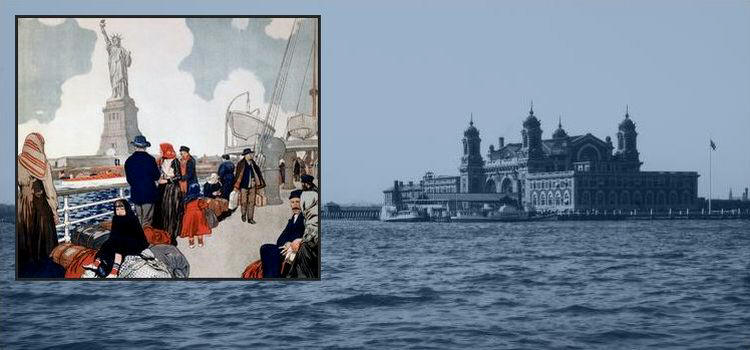
[America, 1895] Two years after Lorenz’ and Annelies visit, Sophie’s dream had come true. With her daughter Lottie and her son-in-law Matthias she stood at the southern tip of Manhattan, looking out over the Atlantic.
Arrival in New York
By their side were Lorenz and Annelie Bergmann. They had received them happily at the pier. “That you are here in America, and Lottie and Matt will be here for a year, it’s just a great thing to happen,” Lorenz marveled again and again. For a moment they all were absorbed in their thoughts. Sophie, too, could not believe it that she was really here with Lorenz and Annelie in the USA.
At Bonn, they had taken the train via Cologne to Hamburg, then got on a steamer of the Hamburg-America line to New York. Lottie had been a little anxious at parting, despite all the anticipation. Would she meet her beloved grandparents Anni and Jean safe and sound after the year in America? But Anni had reassured her, saying that she wanted to drink Lottie’s first wines, that her grandfather would certainly want to know everything about the ocean liners.
Steerage deck
They had enjoyed the sea voyage very much, watching the open sea and hearing the shrieking of the seagulls. Lottie and Matthias were excited about their year in America. Sophie was looking forward to the country which had become a new home for Lorenz. When he fled in 1849, she had been a little girl, and she had never known Lorenz’s uncles Niklas and Heinrich. And yet, their “Merry Dragon” country inn and the “Mountain Men Vineyard” had been so familiar to her since her childhood as if she had been there herself, so often Grandpa Hubert had shown her Niklas’ wonderful drawings and told her about America. That was how long ago it was now, and little Sophie had become Countess Csabany, an elegant woman of the world, mother of two grown-up children.
They had traveled comfortably second class, but their thoughts often wandered to the emigrants on the steerage deck. This deck had been specially introduced to emigrant ships; It was tight and without any comfort, but cheap. Still, many people dared to travel across the Atlantic to build a new life in America. In 1890s it was mainly people from Southern and Eastern Europe, and Russian Jews who had escaped pogroms.
Ellis Island
Upon arriving in New York harbor, welcomed by Lady Liberty, they had stopped at Ellis Island; here the emigrants had to leave the steamer. Since 1892, emigrants were taken here. Castle Garden, the old immigration station where Lorenz had stepped on American soil back then, could not handle the increasing flood of immigrants any long. This and stricter immigration laws, required a more thorough examination, so they had moved to Ellis Island.
Sophie had looked at them for a long time, and silently prayed for them. Her own family had done a lot, and now she felt with these people. Immigrants took a great risk, they could be sent back after a short survey and medical examination. “Check and clear, what a dreadful bureaucratic language,” she thought. “Within a few moments they decide about the destiny of entire families.”
Not all immigrants are welcome
Lorenz, too, kept pondering when he thought of the immigrants. Even so many years after his own escape he felt their hopes and fears with them. He had been welcomed by his uncles Henry and Niklas in New York, and the penniless Irish family whom he had taken with him was equally welcome. Life had been good to him, and he wished the same for these newcomers. “Not everyone in the USA is happy about all the immigrants,” he told Sophie. “Many old-established locals think that the South and East Europeans, unlike the Anglo-Saxons and Germans, will not adapt well and will not share our American values. Many are also afraid of wage dumping, too much foreign influence, and just too many people are coming to the United States who cannot make a living for themselves and will disturb our social fabric.
Guilded Age
That night they stayed in New York, the next day they would travel to Pennsylvania, to Lorenz’and Annelie’s country inn “Merry Dragon” near the Brandywine Creek. Then they would continue to Virginia to the Shenandoah Valley, to the Mountain Men vineyard. For a year, Lottie and Matt would stay in the US, then their father, Count Andras Csabany and their brother Joscha would come and take them home to German. They too had never been to the United States, and could not wait to come. From the southern tip of Manhattan they went through the Battery Park to their hotel. New York was long since a city with over a million inhabitants.
Sophie had travelled and seen many places, but compared to this metropolis, her home on the Rhine, even Brussels, Vienna and Budapest, were small towns. “Philadelphia too has more than a million inhabitants,” said Lorenz. “So much has happened in the last few years, with industry and the economy shaping life in the USA. Carnegie, Westinghouse, Vanderbilt, and Rockefeller, you’ve certainly heard about them. Gilded Age, that’s what the Americans call this time.”
Shall we ring at Carl Schurz’ door?
For dinner, Lorenz and Annelie invited them to a beautiful restaurant from which they could see the ocean. They made a lot of plans for their stay in America, raised their glasses to one another, and enjoyed being together in America. Suddenly Lorenz, the gray-haired elderly gentleman, giggled. Annelie gently stepped on his foot. “Shall we ring at Carl Schurz’s door?” he asked with a mischievous smile, “he’s been living in New York for some time.”
And yet they knew that they would not dare that, just as back then in 1849, when they attended meetings of the democrats in Bonn, they always held a respectful distance from the guests of honor Kinkel and Schurz. That was almost fifty years ago. Now Sophie also had to giggle, and she raised her glass. “Here’s to you, Herr Schurz,” she said, taking a sip. “Let’s drink to both our countries, and may they always be united in peace and friendship.”

Be the first to comment